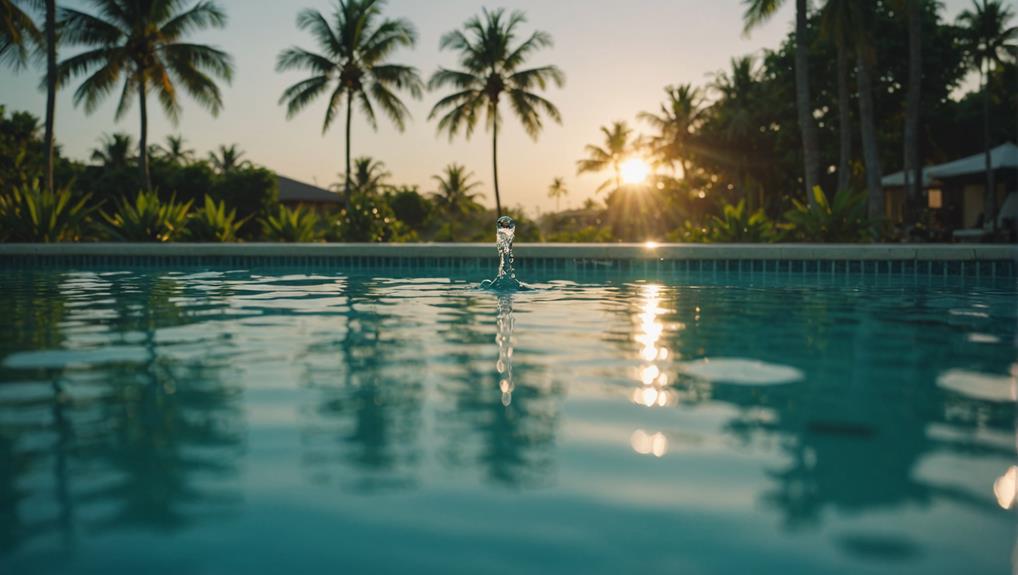You achieve a sparkling saltwater pool system by mastering a combination of precise cleaning routines, ideal water chemistry, efficient circulation, thorough impurity removal, and meticulous balancing. This means regularly checking and adjusting salt levels, inspecting and cleaning filters, and skimming the surface to remove dirt and debris. You'll also need to test and adjust chemical levels, verify proper circulation, and remove impurities regularly. By staying on top of these tasks, you'll be well on your way to a sparkling saltwater pool system. Now, let's plunge into the specifics to verify your pool shines like new all season long.
Key Takeaways
- Regular cleaning and maintenance of the pool filter, walls, and floor prevent dirt and debris buildup, ensuring a sparkling pool.
- Proper water chemistry, including balanced pH, alkalinity, and chlorine levels, is crucial for a safe and healthy swimming environment.
- Effective circulation and distribution of sanitizing agents and chemicals throughout the pool water guarantee a clean and clear pool.
- Regular testing and adjustment of salt levels, as well as removal of impurities and debris, maintain optimal water quality and clarity.
Cleaning Your Saltwater Pool
When you own a saltwater pool, you need to clean it regularly to prevent algae growth, maintain water clarity, and guarantee the longevity of your saltwater chlorination system.
A clean saltwater pool is essential for a safe and enjoyable swimming experience.
You should start by checking the salt levels in your pool water, ensuring they're within the recommended range for your salt chlorinator.
Next, inspect your pool filter and clean or replace it as needed to prevent clogged pipes and inefficient filtration.
Regularly skimming the surface of your pool water and vacuuming the floor will also help remove dirt and debris that can cloud your clear water.
Additionally, brushing the walls and floor of your swimming pool will prevent algae buildup and stains.
By following these cleaning steps, you'll be able to maintain a sparkling saltwater pool that's perfect for relaxation and recreation.
Maintaining Optimal Water Chemistry
By regularly testing and adjusting your saltwater pool's chemical levels, you can guarantee a safe and healthy swimming environment while also protecting your pool equipment and surfaces from damage.
As a saltwater pool owner, vital monitoring of your pool's salinity level is necessary, verifying it remains within the recommended range for your Salt System.
pH levels should also be checked regularly, as fluctuations can affect the effectiveness of your sanitizing agents. Free chlorine levels should be maintained between 1-3 ppm to provide proper sanitization.
To keep your pool water balanced, test the levels regularly and make adjustments as needed.
Proper Water Flow is vital in distributing chemicals evenly throughout the pool. Verify your pool pump is running efficiently to maintain efficient circulation.
By maintaining balanced water chemistry, you'll prevent eye irritation, skin problems, and respiratory issues in swimmers. Additionally, balanced water chemistry will protect your pool equipment and surfaces from corrosion and damage, reducing maintenance costs in the long run.
Ensuring Proper Saltwater Circulation

You must guarantee your pool's circulation system is functioning correctly to distribute sanitizing agents and chemicals evenly throughout the water, thereby preventing stagnant areas that can harbor algae and bacteria growth.
In a saltwater pool, proper circulation is vital to maintain ideal chlorine levels, which are generated by the saltwater chlorine generator.
Verify your pool's pump is running for the recommended 8-10 hours a day to facilitate adequate circulation.
Additionally, check that your pool's filter is clean and functioning correctly, as a clogged filter can hinder circulation.
You should also verify that your pool's return jets are pointed downwards to create a circular motion, promoting even distribution of salt and water throughout the swimming pool.
By maintaining proper circulation, you'll prevent dead spots where algae and bacteria can thrive, guaranteeing your saltwater pool remains sparkling clean and safe for swimmers.
Regularly check your pool's circulation system to identify and address any issues promptly, guaranteeing your pool operates at peak performance.
Removing Impurities and Debris
Effective removal of impurities and debris from your saltwater pool water is essential to maintaining its clarity, safety, and overall health.
To achieve this, you need to guarantee your pool's filter is working efficiently. Fill the skimmer box to halfway up, allowing the filter to remove impurities from the water. Regular backwashing of the filter is also pivotal to remove hidden debris and clean the filter, which helps to remove impurities and debris from the pool water.
Testing your pool water regularly is another essential step. You should test for free chlorine, salt, pH levels, total alkalinity, stabilizer, and total hardness to identify and remove impurities and debris from the water.
Additionally, using a 3-Step Program Kit, which includes a sanitiser, oxidiser, and algaecide, can help remove impurities and debris, resulting in sparkling clean water. Remember to run your pool filter for 6-8 hours a day during the summer and clean it regularly to guarantee your pool water remains clean and clear.
Balancing Your Saltwater Pool

Properly balancing your saltwater pool's chemistry is crucial to maintaining its integrity, as it directly affects the water's clarity, sanitizer efficiency, and swimmers' comfort.
Pools require a delicate balance of chemicals to function effectively, and neglecting this aspect can lead to cloudy water, eye irritation, and even equipment corrosion.
As a Pool Owner, you must make sure to test your water regularly to confirm it falls within the recommended parameters.
Keep your water's pH level between 7.2 and 7.8, and the alkalinity level between 80 and 120 parts per million (ppm).
Calcium hardness should be maintained between 200 and 400 ppm, while the chlorine level should be around 1-3 ppm.
Regular testing will help you identify any imbalances and make necessary adjustments.
Remember, a well-balanced saltwater pool isn't only visually appealing but also safe and comfortable for swimmers.
Frequently Asked Questions
How Do I Make My Pool Water Sparkle?
You make your pool water sparkle by prioritizing regular pool maintenance, ensuring ideal water quality, and efficient pool cleaning, which enhances filter efficiency, allowing sunlight to reflect off the surface, while proper water circulation and aeration reduce surface tension.
What Chemical Makes Your Pool Sparkle?
Like a diamond in the rough, your pool water transforms with the right chemical blend. You'll find that Pool Clarifiers, Water Polishing agents, and Sparkling Agents like BioGuard Pool Complete work as Chemical Boosters, Shine Enhancers, and Reflection Intensifiers to create a brilliant, crystal-clear shine.
How to Get a Saltwater Pool Crystal Clear?
You guarantee a crystal-clear saltwater pool by maintaining ideal pH balance and mineral levels, utilizing efficient saltwater filters, and implementing effective water circulation, algae control, and oxidation methods through regular sanitizing systems and meticulous pool maintenance.
Why Is My Pool Water Not Sparkling?
You're probably wondering why your pool water isn't sparkling – it's likely due to poor pool maintenance, compromised water quality, filter issues, circulation problems, algae growth, pH imbalance, temperature fluctuations, or dirty surfaces, which all impact clarity.
Conclusion
You've taken the necessary steps to make your saltwater pool system sparkle.
You've cleaned it regularly, maintained perfect water chemistry, guaranteed proper circulation, removed impurities and debris, and balanced the water.
Now, ask yourself: what's the point of having a saltwater pool if it's not sparkling clean and safe for swimmers?
By following these essential steps, you'll be enjoying a brilliant, healthy pool experience all season long.

I’m Max, the founder and chief pool enthusiast behind Pool Pro Tips. As a passionate pool owner and cleaning expert, I created this website to share my knowledge and experience with you, helping you to keep your pool sparkling clean and safe for years to come.

